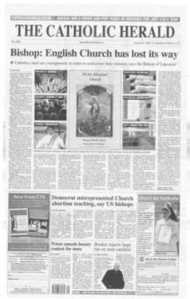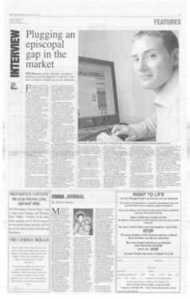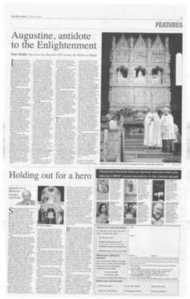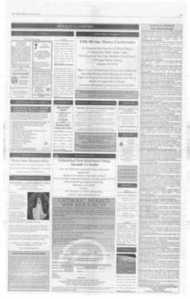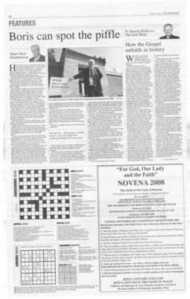Page 11, 29th August 2008
Page 11

Report an error
Noticed an error on this page?If you've noticed an error in this article please click here to report it.
Tags
Share
Related articles
Tvand Radio
Tv
Mary And Joseph Figure In Religious Awards
Tv And Radio Guide To Coverage Of The Visit
PASTOR WVENTUS
Allowing the gift to bear fruit
caught an interesting programme on Radio 4 ' in John Tusa's fascinat ing series comprised of archive material from 1968. This particular programme focused on America. This was the year when Martin Luther King and Bobby Kennedy were assassinated, the year of the Tet Offensive in Vietnam. There were race riots in American cities and anti-war demos.
By coincidence, or at least so I thought at the time, I came across an article from L'Osservatore Romano by James Francis Cardinal Stafford, who is the Vatican's Major Penitentiary. The American cardinal recalls his own summer of 1968 when Pope Paul VI issued his encyclical Humanae Vitae, reaffirming the Church's age-old teaching that artificial birth control robbed the sexual act of its true meaning and fulfilment. The cardinal sets the reception of Humanae l4tae against the backdrop of the division and violence in civil society. This becomes a metaphor for what he felt happened in the Church and what happened to him as a priest.
He writes: "In 1968 something terrible happened in the Church. Within the ministerial priesthood, ruptures developed everywhere among friends which never healed. And the wounds continue to affect the whole Church. The dissent, together with the leaders' manipulation of the anger they fomented, became a supreme test. It changed fundamental relationships with the Church."
He describes how some priest academics at a Catholic university had read, analysed and critiqued Humanae Vitae and composed a 600-word letter of dissent by 9pm on the day of its advance publication. The cardinal describes a sorry gathering of diocesan clergy at which he was bullied and then ostracised by his fellow priests for refusing to add his name to the dissenters.
The cardinal himself is a man of formidable learning and intelligence. His was no "blind obedience". He could give coherent and wise reasons for his conviction that the encydical was right reasons, that is, beyond the obvious and fundamental one that Peter had spoken. He was never allowed to. There was to be no discussion. The dissenters were interested only in being agreed with. The cardinal's summation of the legacy of this time is chillingly accurate: "Contempt for the truth, whether aggressive or passive, has become common in Church life. Dissenting priests, theologians and lay people, have continued their coercive techniques. From the beginning the press has used them to further its own serpentine agenda."
Reading this, two things came to mind. The first was the media coverage of World Youth Day, which bore no resemblance to what was happening in Sydney. Reading the papers you would have thought the city was full of people protesting about papal attitudes to birth control, homosexuality, women priests, clerical celibacy and child abuse. We saw and heard none of it. A handful of dissenters managed to harness the media to their own agenda. In the • Australian press at least, their ridiculously disproportionate status was soon eclipsed by the reality on the ground.
I was reminded also of a time some seven years ago when I still a curate. The parishioners were invited to a series of talks entitled "Catholic Moral Teaching". Under such a banner, the speaker, a moral theologian, and the parish priest, both explained to the faithful how wrong and out of touch Humanae Vitae was and how one could in conscience dissent from it. More nervous then, and not anxious to court public unpleasantness, I nonetheless knew I couldn't let this pass. So I stood up and asked whether you could call a talk "Catholic Moral Teaching" and then publically dissent from the Magisterium. The answer was: "What about lay people? Don't they have a magisterium too?" To which, of course the answer is emphatically No, not if by that you mean they have a different one to the "official" one. But of course, it sounds plausible enough if your "model of Church" as the jargon puts it, is based on a Marxist view of historical necessity. The question also skilfully opposes individual moral conscience to the obedience owed to the Magisterium, as though by unilaterally finding your conscience unable to comply with one of its prescriptions you have shown that prescription to be universally false. Naturally I believe in the sensus fideliurn, but not when it was being manipulated and abused and coerced into dissent, as it was here.
Just a couple of days after reading his article, I received a letter from Cardinal Staffonl. You see, I was ordained to the priesthood by him in Rome. He had seen the Herald's coverage of World Youth Day and seen my name and the details of our group and wrote to share his wonder at the fruits of WYD and to offer words of encouragement: "You have allowed the gift of the Holy Spirit to bear fruit." He then quotes a line from Meister Eckhart which appears also in his article: "Gratitude for the gift is shown only by allowing it to make one fruitful." When it comes to vocation, be it marriage or priesthood, as the Americans say, that seems to cover all the bases.
blog comments powered by Disqus


